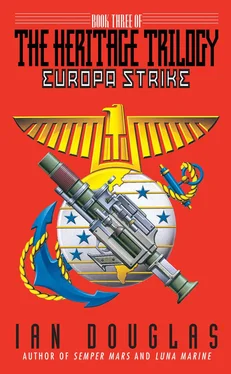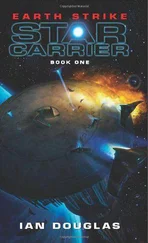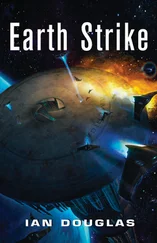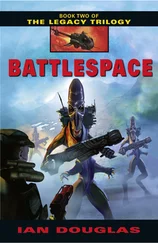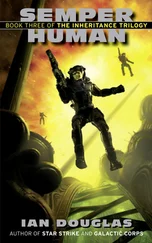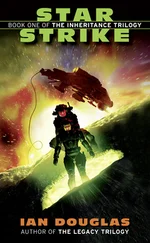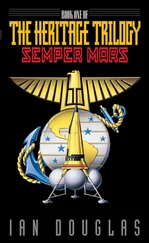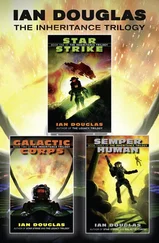He wasn’t wearing rank insignia, but he knew what Puller meant. A company was normally a captain’s command, but in a small and isolated detachment like this one, the senior officers tended to double up on their duties and their responsibilities. His 21C, the second-in-command of Bravo Company, was a captain named Paul Melendez; his command duties were divided between Bravo Company, his position on the MSEF’s operations staff, and his responsibilities as XO for the entire detachment.
The higher an officer’s rank, though, the more detached he tended to be from the enlisted men, and a major—usually the commander of an entire battalion—was pretty far up there among the clouds.
“Colonel Norden doesn’t like his officers fraternizing that much with the men,” Jeff pointed out.
“Fraternization be damned! Who’s gonna be on the line out there, son? Mopey Dick or your men? You need to be careful that you don’t make an ass of yourself, of course. You need to hold their respect.” Puller’s grin widened. “Hell, that’s why most officers don’t fraternize. They’re afraid of looking like idiots. But your people deserve better. Let ’em know you’re in the foxhole with ’em. And, by God, when the shooting starts, be sure you are in there with ’em.”
“I understand,” Jeff said. “But…well, Europa is going to have some special challenges for us. Radiation. The cold and ice. And there’s a possibility now we’ll be facing the Chinese as well. I need to know what I’m overlooking. What I’m missing.”
“That, son, is the responsibility of your senior NCOs and your junior officers. You just make sure your men can see you. The hardest part is always the twenty-four hours before you go in. The waiting.” Chesty Puller’s image looked thoughtful, almost musing. “Chinese and ice, huh? Sounds like Chosin all over again.”
Jeff had to think a moment, but the reference came to him. Puller, the original Chesty Puller, had won his fifth Navy Cross and the Army Distinguished Service Cross at the Chosin Reservoir, in North Korea, during a hellish retreat through deadly, bitter cold, under constant attack by Chinese forces. When informed that his regiment was surrounded, he had said, “Those poor bastards. They’ve got us right where we want them. We can shoot in every direction now.” He’d led his men down sixty miles of icy mountain road as they fought their way out of the trap. It was one of the Corps’ prouder memories.
“Shouldn’t be that bad, General,” he replied. “The temperature’ll be 140 below, but we’ll be a hell of a lot better equipped and supplied than you were at Chosin. And the Chinese probably won’t be a factor. Not with the JFK riding shotgun.”
“If you’re lucky, you’re right,” Puller said. “If you’re smart, you’ll be prepared. For anything.”
A mental command, five memorized digits and the word “disconnect” repeated hard in his thoughts three times, broke the VR connection. He blinked at the gray-painted overhead, reestablishing his awareness of what was real and what wasn’t. After a moment, he removed the VR headgear, stowed it, and walked back into the common area.
In one of the arms lockers aft he found a Sunbeam M-228 squad laser weapon, a 10-megawatt SLAW, and carried it forward to the mess table. “Mind if I join you?” he asked, taking a seat with the ten men and women cleaning their M580s.
“Of course not, sir,” one of the men said. He was a skinny, sharp-faced corporal from New York named George Leckie. “Grab some chair!”
Gunnery Sergeant Tom Pope grinned. “Slumming, sir?”
“Gunny, after four hours of staff meetings, I consider it R&R.”
“I hear ya, sir.”
One of the women—with hard muscles and sweat gleaming on her bare chest—said something to the blond woman beside her, and both laughed.
“What was that, Campanelli? Didn’t catch it.”
“Uh…nothing, sir.” When he continued to look at her, she shifted uncomfortably and added, “I just said that that was a damned big gun you had there, and, uh, I wondered if the major knew how to use it. Sir.” Her chest and shoulders flushed dark as she spoke. Marines never used the word gun except to refer to artillery—especially shipboard guns—or a penis. The squad laser was a weapon, a piece, an M228, or a SLAW. Not a gun.
“Well, it’s been a few years,” he said easily. “Maybe you can give me some pointers.” The others laughed, a little nervously, but louder when he grinned.
It had been a good many years since he’d had to do this, but his hands remembered the proper movements. Power off…cable feed disconnect…pull the barrel locking lever back…grasp the barrel with the other hand and pull forward and up…
Yeah, he remembered. And before long, he was trading jokes with them.
12 OCTOBER 2067
U.S.S. John F. Kennedy
Solar orbit, 4.2 a.u. from Earth
2002 hours Zulu
Captain Jeremy Mitchell entered the officer’s wardroom with his tray and walked toward the only occupied table. Gone were the days when the other officers present stood until he was seated; the JFK’s officer’s mess was patterned off of the dirty shirt mess decks of Navy aircraft carriers, with food served cafeteria style. It was located in “A” Hab, with the hab rotation set to deliver a gentle third of a gravity.
“Mind if I join you gentlemen?” he asked with an easy drawl. Mitchell was from a small town not far from San Antonio, Texas, and liked to affect the laid-back attitude of Texas and good-natured down-home.
“Please do, Captain!” Commander Varley, the weapons officer, said, gesturing.
He set his tray down and took a seat. “Well, Mr. Lee,” he said, addressing the young Marine officer on his left. “It looks like you and your people might get a chance to prove your usefulness, even in this day and age.”
“Is there any more data on the Star Mountain’s vector, sir?” He sounded eager…and painfully young.
“Nothing new. They’re still vectored for Jupiter—which means Europa—and they’re boosting at 2 Gs, which means they’re in a damned hurry to get there. They won’t be able to sidestep us, however.”
“Peaceforcers save Earth, once again!” Lieutenant Commander Carvelle, the chief communications officer, said, raising a glass in salute.
Peaceforce. It was a new concept, born of one particular horror of the UN War. A French attempt to smash the U.S. will to continue the fight by diverting a small asteroid into an impact on Colorado had been stopped…almost completely. A fair-sized and somewhat radioactive piece of the UN ship that had done the diverting had come down over Lake Michigan and obliterated most of lakeside Chicago.
With the rapid expansion of human activity into the Solar System, the Confederation of World States, struggling to knock together some form of planet-wide government to replace the disintegrating UN, had recognized the danger posed by any world power able to put a spacecraft into the asteroid belt or beyond. A relatively small nudge could put a likely megaton chunk of iron or ice into a new orbit, one that could take out anything from a city to the entire human race, depending on how ambitious the bad guys were.
The threat had resulted in the Peaceforce, a military space force drawn from the United States Navy, the Marines, and the space assets of several allies tasked with patrolling the outer system and preventing just such attempts. The problem was that the Solar System was an awfully big backyard, too vast by far to allow any kind of systematic patrolling.
And the trick was to position just a few ships in strategic orbits, far, far up the side of the Solar gravity well. Orbiting in the Asteroid Belt, 4.2 a.u.s out, and employing extremely powerful sensing and tracking gear, a ship could watch for any launches from Earth. Any boosts not cleared by CWS inspection teams could be intercepted by ships such as the Kennedy and either disabled at a distance, or boarded.
Читать дальше
